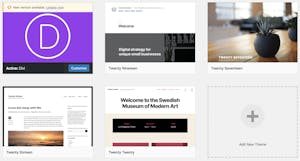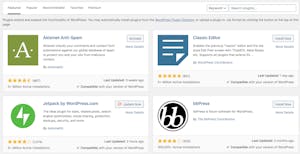- 4 minute read
- Digital Marketing
- SEO
3 Simple Blog Writing Tips to Grow Engagement and Conversions
All Skill Levels
Join hundreds of other operators and REGISTER NOW for Spark 2024 New Orleans October 13-15th!

Having a website is an essential component of any business, large or small, and it’s particularly important for tour and activity operators. Travelers today are looking for ease and convenience when they’re making their travel plans, and that means booking their tours and activities quickly and easily online. In 2018, 82% of all travel bookings were made online via a mobile app or website, without human interaction (Condor). Your website is the primary source of information for travelers to learn about your offerings and to make a booking. When done well, it enables you to generate business, create brand awareness, and deliver a tailored marketing message. Check out the five main benefits of selling online in another Compass guide.
Whether you are ready to start from scratch on a new website or are looking to refresh an existing website, there are many different user-friendly website building platforms to choose from. The best thing about them: You don’t have to have extensive technical or coding skills to build a beautiful site.
In this guide, we review a handful of the most popular and user-friendly platforms to help you determine which one will work best for you.
WordPress is a big name when it comes to creating websites, with some estimates saying the software powers 35% of all sites on the web. It is a free, open-source, blog-focused content management platform that comes from WordPress.org. It accepts plug-ins and themes that extend its capabilities to what most of the other platforms on this list offer, including e-commerce.
WordPress gives you complete control over every aspect of your website. It can be used to build any kind of website – such as an e-commerce store, community forums, a social network, a membership website, a personal website, and more. Adding content is easy with a basic WYSIWYG style editor (visual editor) as well as the ability to add HTML formatting to the page (text editor).
There are thousands of pre-made WordPress designs called “themes” that you can select from when building your website. If you’re feeling a little more creative, it also has impressive drag-and-drop page builders like Beaver Builder and Divi, which allow you to easily create your own page layouts. These tools allow you to add additional features and functionality to your website such as contact forms, Google Analytics tracking, photo galleries, social media embeds, live chat options, and much more. Based on your specific needs, you may choose to purchase premium WordPress themes; additionally, certain extensions and more robust features will have additional costs.

Another platform benefit worth mentioning is that WordPress is fully translated into dozens of languages and can be easily used to create multilingual websites. It also comes with powerful SEO plugins that search engines love, and this helps to improve your website’s ranking in the SERPs. An added bonus is that, due to its high usage at a global scale, the ability to use WordPress is a valuable skill to have in your arsenal.
When you consider all the above benefits and the set of tools the platform includes, WordPress is by far the best value website builder on the market. However, WordPress is not always as easy to use as the other options in this roundup. If blogging and site transferability are of key importance and you don’t mind digging into the weeds a bit, you should consider this platform.

A final item to note when considering WordPress is that you will need to decide where your website will be hosted. Many website building platforms also offer hosting services (i.e. GoDaddy), but WordPress does not. However, WordPress.org software is such a popular site-building platform that many web hosting services offer managed WordPress hosting plans.
WordPress.COM is different from WordPress.ORG — it is built on top of the same WordPress software but with a custom user experience. This article does a very thorough job of detailing the main differences between the two platforms.

It is very easy to get started with WordPress.com — there is no complex installation or maintenance process, and you can put together a basic website pretty quickly. As with WordPress(.org), the backend takes some getting used to, especially for beginners. The platform offers a range of plans and pricing structures, each of which comes with various limitations and benefits, including theme and plug-in limitations at the higher-paid levels.
As would be expected the free and paid plans come with different sets of features – but all plans allow users to choose from hundreds of both free and paid WordPress themes. You can then use the built-in “customizer” to add your site title, embed widgets, add navigation menus, and so on. Important to note: you cannot install custom plugins or themes unless you upgrade to their business plan. Premium and lower-tiered plans do not have e-commerce features or third-party ad network support. With the business plan, you can use WooCommerce and third-party ad networks.
Wix’s website builder has visually impressive layouts that are designed for small businesses and e-commerce. There are hundreds of well-designed templates that you can use for free, and Wix’s user-friendly templates makes it easy to adapt them to your needs. They are optimized for mobile devices and can be spiced up with one of the numerous apps available from the Wix App Market.

Wix is not perfect for everyone. It’s not the best site builder to create larger websites (30+ pages). The navigation isn’t very deep and doesn’t allow for complex site structures. Also, it’s not possible to simply switch to an entirely new theme if you get bored of your existing one (other website builders make this easier). Lastly, the template loading speeds are slow on mobile devices.
Overall, Wix focuses on DIYers who don’t need technical features but a wide assortment of user-friendly tools and templates.
With an intuitive interface and responsive design themes, Weebly is an affordable and user-friendly platform. It also has e-commerce capabilities and comes with site performance statistics. Weebly is equipped with a drag-and-drop website builder with 40+ mobile-friendly themes, blogging capabilities, and an App Center.

Generally, Weebly focuses on user-functionality and on-boarding clients, but it has limited template designs.
Squarespace’s drag-and-drop platform is well known for its designer-quality templates, modern features, and mobile responsiveness. Its sleek designs and powerful built-in features allow users to create stunning websites without needing to know a line of code.
But it’s not for everyone. Beginners may get overwhelmed by its abundance of features, so it’s best for those with some web design experience. While Squarespace doesn’t have a free plan like some website builders, it does offer a free 14-day trial on all its paid plans. Note: Squarespace is offering 20% any new website plan in April 2020.

Overall, Squarespace focuses mainly on design, developer tools/features, and branding, while relying on user-generated photography for full benefits.
Building a new website can seem daunting, but with the availability of all these robust and user-friendly platforms, you’re sure to find one that meets your needs. With one of these easy-to-use platforms, you can start improving your company’s online presence and reaching new customers. Once you’ve selected the platform that works best for you, make sure your website is optimized to rank and convert, has a friendly user experience, and is optimized for search engines. Explore our website and SEO guides for more tips!